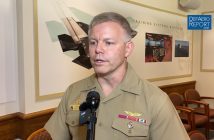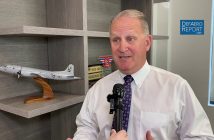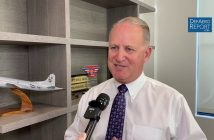Gen. Stephen “Seve” Wilson, USAF, the US Air Force vice chief of staff, discusses lessons from entrepreneurs like Mark Cuban, learning from failure, harvesting good ideas and the Pitch Day in New York City on March 6, 2019, with Air Force Acquisition Chief Will Roper, PhD, with Defense & Aerospace Report Editor Vago Muradian at the Air Force Association’s 2019 Air Warfare Symposium in Orlando. Our coverage was sponsored by L3 Technologies and Leonardo DRS.
Vago Muradian: Welcome to the Defense and Aerospace Report. I’m Vago Muradian here in Orlando, Florida for the Air Force Association’s Annual Air Warfare Symposium, the number one winter gathering of U.S. Air Force leaders, industry executives, thought leaders, analysts, as well as the media down here in Florida where our coverage is sponsored by Leonardo DRS and L3 Technologies.
And we’re positively honored to have with us the Vice Chief of Staff of the United States Air Force, General Seve Wilson. Sir, thanks very much for making time for us, and what a fantastic discussion you had with Mark Cuban, the entrepreneur.
Why are conversations like that so important? Last year we saw General Spencer, your predecessor, who is the President of the Air Force Association at least for just a little bit longer, who had a conversation with Jeff Bezos. Why are dialogues like this so important for you and so important for the entrepreneurial community, since you’re the chief innovation officer of the Air Force?
General Seve Wilson: First of all, this is a great diversity of thought. We get outside of our little stovepipe of only military thinking and the folks that we’re dealing with, and bring in guys. In Mark’s case he’s the Maverick’s owner, he’s in TV and media. He thinks differently. Let’s bring his ideas and see what has worked for him and how do we apply that to what would work for us in the military.
So it’s actually a two-way conversation. We’re hoping that we’ll learn something, but we also hope that he’ll be around our airmen and maybe teach them a little something about what our Department of Defense is doing, what our Air Force is doing, and how we can both help each other.
Mr. Muradian: What do you think the key lessons are for each side of this dialogue? What is it important that the entrepreneurial community learn about the Air Force and what’s important for the Air Force to learn about the entrepreneurial community and how they work and think?
General Wilson: First of all, you see how we think differently. You saw him on when he was on the Spark Tank, right? What’s this do for me? How do you communicate this idea? He thought big enough. Can you scale it fast enough? What’s the alternative? He’s making us think in ways that probably we haven’t thought before. So that’s the goodness that he brings to it.
I also thought that he had a couple of really important parts on the ability to communicate your idea. I’ve got a bunch of brilliant guys, but if they can’t communicate that concept, that belief, then I’ve not gotten anywhere with them.
A second piece is how do we take big ideas, and not just — he would say go bold, go big. You just try to make an increment of change. Sometimes that’s good enough, but did you really reach for the brass bar?
He talked about be fearless. So what? We fail. He talked about I’ve failed lots of times. It’s okay. We’re going to dust ourselves off, we’re going to figure out why we failed and we’re going to go after it again and do it better. And this time we’re not going to fail. But failure’s part of this whole innovation part that we’re doing.
I’ll tell you, I don’t want everybody to go out there and all we do is fail, but certainly we have to, we’re not going to get it 100 percent every time. We’re going to have some missteps. We’re going to figure out what we did wrong and then try and make it better.
Mr. Muradian: He also talked about this guy named Travis called up with this idea called Uber.
General Wilson: And whoops. Swung and missed. Yeah. Okay. But he also said hey, water under the bridge. There’s lots of other things out there. I’m moving on. I forget the analogy he used behind that, but again, I think we can learn from that.
Mr. Muradian: Let me ask you about all the initiatives. Every time we talk, we get a little bit of an update on where we are. You have the Vice Chief Challenge, obviously, which is a very important thing. You’re going to be in New York next week with Dr. Will Roper, the Acquisition Executive, where you guys are doing a Pitch Fest. About 300 proposals you guys are going to have to sift through. Talk to us about where we are —
General Wilson: A couple of pieces. Let’s do Vice Chief Challenge. Remember we started with how do I crowdsource airmen’s ideas, and rather than go bottom up, which is good, how do I also go top down on a really hard problem. In this case, multi-domain operations. And how do I connect, steer and learn across air, space and cyber, and how would I do a visualization of that idea.
So we got lots of ideas. We’ve down-sourced to now a few of those ideas. We’re going to bring in industry and academia. We’re going to continue to further refine those hopefully here by AFA Fall, so in September. I won’t say we’ll pick the winner, but we’re going to have the winning, the best ideas come forward and then we’re going to present those at AFA in September. That’s my sea challenge. Pitch Day.
So Pitch Day, you saw, we’ve got lots of bureaucracy and how do I get people, small businesses on contract fast? So they’ve gone out, they’ve searched across a bunch of small businesses, they took 300 of them. We’ve actually scaled down to just under 60, I think it’s 59. They’re going to give pitches to us and the goal is, same day, swipe a GPC card, put you on contract, and again, we have $40 million set aside for small businesses to now work with the Air Force. And it’s a big improvement. We’ve done this before, we did 100 contracts inside 40 hours. When Dr. Roper did it before we got about 200 submissions to do that. This time we’ve got over 300 submissions. So the word’s getting out. Hey, we are a place for business. The Air Force is open and small business is jumping into it. So both of those I think are good, we’re making really good progress.
Mr. Muradian: There was a speed thing, right? Everybody’s talking about accelerating it. Dr. Roper is talking about we’ve already taken 70 years —
General Wilson: Seventy-eight years.
Mr. Muradian: Seventy-eight years.
General Wilson: We’re going for 100, but 78 years.
Mr. Muradian: That’s right, because it was the Century Challenge. One of the greatest airmen in this hall is Lieutenant General Tom Stafford, the Apollo 10 commander. One of America’s great airmen. One of America’s greatest, and one of the world’s greatest astronauts, is here. He and I were talking and catching up a little bit, and one of the things he was talking about was sort of the speed of the space program. That once the decision was made to do a lunar rendezvous, in like five years we built two of the largest buildings in the world. We built multiple rockets. The —
General Wilson: The biggest rocket in the world. Right.
Mr. Muradian: Biggest rocket in the world. Deep space communications. All these networks that were all ready to go for Apollo 8 which was the first trans-lunar mission.
What can we learn? It’s the 50thAnniversary of the Apollo moon landings. Two of the three-man crew were airmen. Buzz Aldrin and Mike Collin.
General Wilson: You’re taking out my words. I use this as a great example. We’ve been there before. We know how to do this. But we had a clear vision on what we were going to do and we as a nation were all in. But we went from a little over eight years, from May 25, 1961 when President Kennedy said we’re going to the moon and back, until July 1969 we went to the moon and back. And look what we did across the Mercury, Gemini, Apollo — 36 space launches. We had some really big failures. We had Apollo 1. Gus Grissom, Ed White and Roger Chaffee. A huge setback. But it didn’t stop us. We were going to get to the moon and back and we were going — we had competition.
You talked to General Stafford, an amazing guy. I sat down with him recently and again, this is this whole culture of can. We can do this.
So I tried to frame earlier kind of the three things that I’ve been talking about. Why, what’s different? Well, we’re in this great power competition. That’s our why. We look at what our potential adversaries are doing, how fast they’re modernizing, what their mega projects are, what they’re investing in, and they’re whole of nation in. So that’s our, okay, that’s the competition.
I use that exact analogy of the space program. Fifty years ago we came together against a competitor and said we’re going to get there and we’re going to win. So the what.
The who is us. Ordinary Americans across the world. We put these people, the astronauts on a pedestal. If you were to ask him he’d go hey, I was just doing my job. I was just trying to make a difference.
So I look across the force and say hey, all of us, I want you to join us on our journey because we’re in it to win. Your United States Air Force.
Mr. Muradian: Let me take you back to one of the things that Mark Cuban said which was the focus on artificial intelligence. He was talking about it from almost the ground up to make sure you’re educating airmen on that.
When it comes to the AI challenge, and he basically, he put a marker down saying look, China is in the lead in this or is investing heavily in it.
From your perspective, how do you work that part of the problem when a lot of people don’t even fully understand what AI really is and what it can mean and do?
General Wilson: Here’s a couple of things I’d say. So when we talk to the Defense Innovation Board, guys like Eric [Smitten] and bringing Mark and his ideas along are really important too.
China is doing things differently. They’re doing it in scale. They’re graduating eight times the STEM graduates. They don’t have the same privacy concerns. They don’t have the same intellectual property concerns. I’ll say it another way. They’re taking stuff from us, they’re modifying it for them. What they do with the data, we would have real big privacy concerns. Look at the app We Chat. One-third of the world’s internet users use We Chat which the Chinese government gets all the data. So they know where you’re going, who you’re talking to, what you’re doing, what you’re spending. All that data goes to China. That gives them an advantage and some insights on this artificial intelligence, machine data, big learning competition.
They also have pretty talented folks. Again, that’s the competition and we know that, we have to be able to compete against that.
I would argue that our academia, some of our universities, whether it be MIT, whether it’s Stanford, Carnegie Melon, some of the world leaders in artificial intelligence. The really smart people are working there. Our national labs, incredible. They’re doing some incredible stuff. Industry. All the big industry giants, whether it be Google, Facebook, Apple, Microsoft. They’re doing some incredible stuff.
The department’s doing some pretty good stuff, but we’ve got to come together, all of us, much like we did in the space program to say hey folks, this is really important. We can’t get behind in here and we’ve got to stay in the forefront. But it’s going to take all of us working together to be able to do that.
Mr. Muradian: I’ve got a lot of questions I want to ask you, but I’m going to ask you the one question which is space, the President signed the National Space Policy Directive for, orders the Air Force to establish a Space Corps. Short of a Space Force at this point, but he indicated that that’s certainly the road that he wants to go on. At this point there is going to be a debate on it. But talk to us about the plan the Air Force has to execute this and to do it in the best way, to yield the best results at the end of the day, which is what this initiative, at least its supporters argue is the point.
General Wilson: Let me start off with the great news that the President’s done is get space around the kitchen tables and coffee tables of America about how important it is. Because there’s nothing the Joint Force, and quite frankly there’s nothing that America doesn’t do that doesn’t involve space. And we’ve been the world leaders in space. We’re the ones who designed everything from GPS to the worldwide communications to missile warning and satellite communication happens primarily in the United States Air Force. We’re the envy of the world, but we also know that our adversaries have looked at it, they’ve studied us, they’ve seen what we’re doing, and they’re trying to catch up. And we’re trying to stay ahead. So that’s why elevating space is so important, and it’s why we’re standing up a new combatant command for space, and that’s why the President’s put out the Space Policy Directive for it.
So what we’ve done is we’ve got a planning team underway led by a two-star who is bringing together the team to make sure that we can take all the inputs, to be transparent across it, to be able to bring forward a plan to be able to execute the President’s directive, the Space Policy Directive for.
Mr. Muradian: And roughly how long do you think it will be before we see a report and the fruits of that work?
General Wilson: We should see, there’s a couple of things going forward. There’s the legislative proposal going forward imminently, I think it was released today or last night, so we should see that, more detail on that. And the planning effort, initial tranche feedback to the Secretary within about 30 days. Then we’re going to see where that takes us from there. That won’t be the final thing, but we owe her an interim feedback within 30 days.
Mr. Muradian: I’ve covered the Air Force for now since 1993, and throughout that time the Air Force has always had a focus on space. Even a historian of the Air Force, the Air Force was into space before it was the United States Air Force. It was the Army Air Forces and Hap Arnold was already looking at that. The Scientific Advisory Board was looking at the high ground.
From a narrative standpoint, though, this idea has sort of taken over that somehow the Air Force was sort of mismanaging in space. Does the Air Force have to do a better job in sort of countering that narrative at some point? Given how much time, attention, money, resources, the Air Force has invested in this to create this architecture?
General Wilson: We need to be able to tell our story about what our Air Force is doing today across everything in space. We’ve been really good stewards. We’re the gold standard of which every country in the world is envious of our space capability. And the United States Air Force are the ones who have been doing that.
So I think we just have to do a better job of telling that story to the American public.
Mr. Muradian: General Seve Wilson, Vice Chief of Staff of the United States Air Force. Sir, thanks very much. Tremendous job with Mark Cuban on the stage.
General Wilson: I had a great time. He didn’t include me in the will, though. That’s next time.
Mr. Muradian: Really, for a step-brother —
General Wilson: Should have been in the will.
Mr. Muradian: Sir, thanks again.
30




